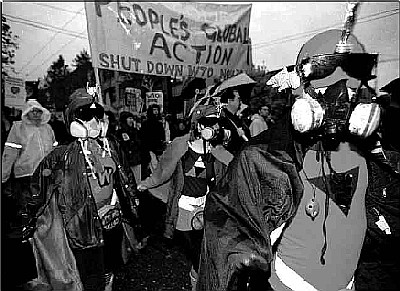Contents
|
|
Editorial
While economic globalisation affects us all, the manifestations of it are different, as are the responses to it. We believe that the first step towards building a movement that's as transnational as capital is finding common ground.
This collection of interviews with women was recorded in Cochabamba, Bolivia at the 3rd international conference of the People's Global Action (PGA) network in September 2001. It covers women's involvement in a broad range of struggles: from culture-jamming in Australia, to coca-growing trade unions in Bolivia, from autonomous land settlers in Brazil, to radical environmentalists from the Ukraine. Political influences range from liberation theology to radical ecology, Marxism to anarchism, feminism to syndicalism and back again.
The main themes include leadership versus horizontal organising; the role of women in revolutionary struggle; the personal road to radicalisation; the potentials and pitfalls of the PGA network; resistance to "savage capitalism"; and visions of a better world.
We chose to do 12 interviews, solely with women for a number of reasons. Firstly, we are women activists ourselves, based in the UK, and we wanted to find out more about the experiences of other women engaged in political struggle around the world.
Secondly, following on from the first European PGA conference in Milan, and the gender conference in Panama in 2001, we knew that gender would be a central theme in Cochabamba. Despite a valiant attempt to integrate the gender perspective into the inner workings of PGA, men have dominated the conferences, gender continues to be an add-on, and in the past there have been instances of sexual harassment. Although there was a genuine effort to translate the idea of gender equality into practice in Cochabamba, women were once again silenced. This is our attempt to redress the balance.
Thirdly, we are highlighting the fact that women from all corners of the world are working towards freedom from exploitation and domination. We hope this will inspire women to act, and re-ignite those women who have found it virtually impossible to balance a politically active life with the demands of family and finances.
It can be difficult to fully grasp what PGA is, what it does and even who is part of it. But these interviews show that, however contradictory and chaotic this network is, it involves real people and has a direct effect on people's struggles around the world.
Given that the meeting took place in Bolivia, the majority of participants were from Latin America, which is reflected in the selection of interviewees. We would like to have had more of a balanced representation of women from all five continents.
There are plenty of reports about the discussions, workshops and decisions made at the conference (these are mostly on the PGA website, or contact us for printed versions), which is why the following pages only touch superficially on these.
It has taken almost a year to put the book together because, symptomatic of the PGA network as a whole, we live in different parts of the UK. We have to make a living and are involved in our own neighbourhood revolutions, all of which made meeting up a logistical feat. However, as global capitalism was alive and well as we went to press, we figured it was all still relevant.
We should also mention that we've shamelessly reproduced other peoples' writing, so if you do recognise your words, we'd like to thank you and, as editing is a sensitive business, hope we've done justice to your writing.
Just a technical point to bear in mind as you settle down to read this from cover to cover. The depth of the interviews depended greatly on language and translation possibilities. In some cases, English and Spanish were people's second or third languages - for both us as interviewers and for most of the interviewees. lnstead of excluding women who didn't speak our languages, we have included their accounts, on the basis that although there is less detail, the message is still clear.
We would like to be able to publish this collection in Spanish too, so please get in touch if you can help with producing a translation. Any profits made from the sale of this booklet will go towards a Spanish reprint and towards a PGA travel fund, to enable people from the South and Eastern Europe to get to PGA meetings. The full text can be downloaded from the PGA website soon, and is anti-copyright for non-commercial purposes.
The main thanks, of course, goes to all the women we interviewed, and to the proof- readers and Karen for design and layout.
next: PGA in a Nutshell
For copies or further info, contact:
PGA Women c/o London Action Resource Centre (LARC)
62 Fieldgate Street, Whitechapel
London, E1 1ES, UK
Email: pgabolivia  yahoo.co.uk
yahoo.co.uk
£3.50 per copy

